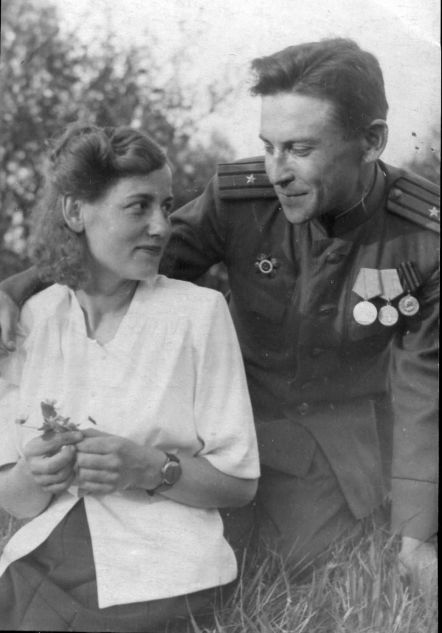My grandfather Mikhail Fedorovich Loshchits (1917-2015) went through the war from the first to the last day. He served as a military journalist on the Leningrad front. He was an instructor in the political department of a division, a secretary, and then an editor of the divisional newspaper “In the line of duty”. The story “On the Last Day of the War” tells a little-known episode – the surrender of a group of German troops ambushed in the so-called Courland Pocket in western Latvia. It was only on 8 May that fierce fighting stopped there, however, some units resisted until the end of the month.
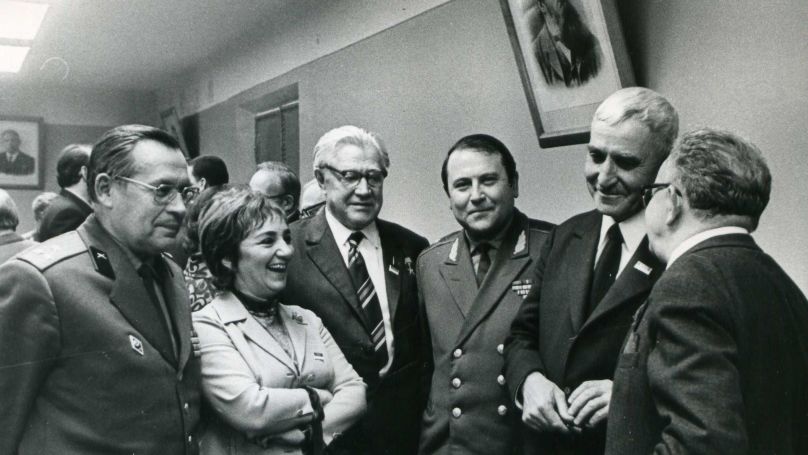
The story accurately represents the military events of 8 May 1945 and the atmosphere of that day. Grandfather portrayed himself in the image of battalion commander Vasily Ivanovich Luzhkov, (he created the name Luzhkov from the name of the city of Luga that was liberated by his 123rd Infantry Division). He also told us the story of an anti-fascist German. Years after the end of the war, grandfather tried to find him in Karlovy Vary, but he didn’t succeed.
Mikhail Loshchits ended the war as a deputy regiment commander. He was awarded the Order of the Patriotic War (I class), the Order of the Red Star, medals "For Courage", "For Military Merit", "For the Defence of Leningrad", and "For Victory over Germany in the Great Patriotic War of 1941-1945". After the victory, he continued his journalistic path, achieving the rank of first deputy editor-in-chief of the newspaper Krasnaya Zvezda. He retired in 1979 as a major general, but continued to write to a ripe old age - he published his last article in Krasnaya Zvezda at the age of 90.
Every 9 May we gathered at his house. Grandfather recalled the war days quite often, although, like many frontline soldiers, selectively and not always in detail.
Grandfather died at the age of ninety-seven. He lived with my grandmother for almost seventy years. She was a rural teacher named Tamara Zakharovna Grabovenko. They had two children, five grandchildren, and fourteen great-grandchildren.
He was a devoted communist – both in Soviet times and after the collapse of the country. We often disagreed with him, but we knew that grandfather's views were sincere. Despite the posts and the rank of general, grandfather only had what he was supposed to have according to his position, and he lived very modestly in retirement.
Source: Mikhail Loshchits “On the Frontline: Notes of a War Correspondent” Leningrad, Leninzdat, 1988
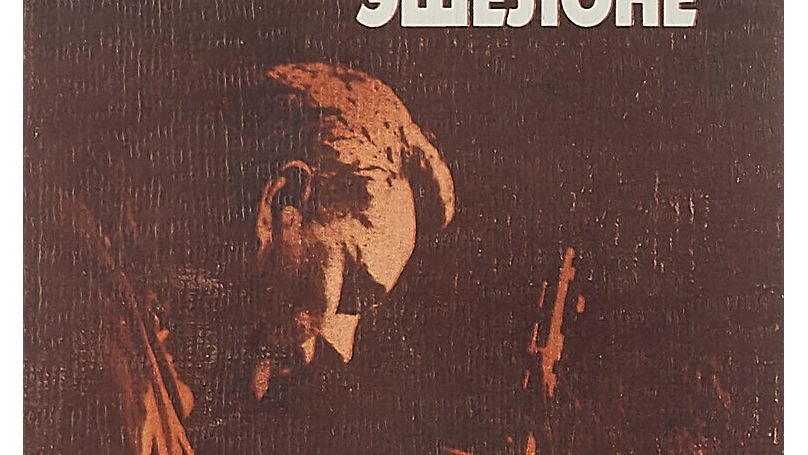
On the Last Day of the War
On one fine February day, an invalid approached the colonnade of the Karlovy Vary springs. He leaned his light crutch against the column and, bent down to the water leaning on the other crutch, filled his cup and began to drink slowly. Another man of approximately the same age was watching him at that moment.
The name of this second individual was Vasily Ivanovich. It was his fifth day after arriving in Karlovy Vary from the Soviet Union and he stayed in a sanatorium with a rather unusual, somewhat frightening name "Imperial". Vasily Ivanovich showed great interest in the famous resort and everything connected with it. He listened to a lecture at the sanatorium’s local club and, having made a number of important discoveries, wandered down the Peter the Great Street, surprised by the fact that the Emperor of All Russia had also visited these places. He took his wife to find the monument to Peter the Great that was lost in the mountains. He was grumbling that there was no markers to the monument: markers to two restaurants could be seen everywhere but there was not a single mention of the monument. They had to stop passers-by and ask for directions. One Czech, who was returning drunk from a restaurant in the company of two more pals, willingly helped Vasily Ivanovich and told him, as he thought, an important fact about the Russian tsar. He confidentially explained that Peter I spent time in the mountains, and in the evenings he went down to drink water in the spring and cut the beards of his merchants.
Vasily Ivanovich couldn’t refuse his wife a visit to an Orthodox Russian church that had been built by the same generous Russian merchants.
The walk around the city and stroll in the mountains took their toll: in the evening he had sore legs and went to bed early. He slept soundly, but woke up in the middle of the night and looked at his watch – it was a quarter past three – and decided that he must certainly fall asleep again: there is nothing worse than getting used to being awake at night.
But he could not get any sleep. All sorts of thoughts climbed into his head and he woke up completely. The bust of Peter I appeared before his eyes as well as a metal plate underneath it with the words of the poet Vyazemsky. Vasily Ivanovich wanted to write down the words yesterday, but then changed his mind: Pushkin also wrote about Peter freely and uninhibitedly, one might say in a republican manner, while Vyazemsky did it somewhat pompously, slavishly: being a prince, he wrote about him in a princely manner.
He had a million thoughts in his mind until he suddenly remembered yesterday's invalid. Vasily Ivanovich was thought for a long time. The thing was that the person he saw vaguely resembled someone. That man was a German – he did not doubt since he heard excerpts of his conversation with another person who came with him. But why had this blond man with an open and kind face caught his attention? Why him? Where and when could he have met him before?
He chased these thoughts away, but they kept coming back to him. And then – almost involuntarily – Vasily Ivanovich began to recall those Germans that he happened to meet at the front. And of course, he saw prisoners of war and even those he could count on his fingers – how big the battalion was and company level, where the retired Major Luzhkov spent almost the entire war.
Sleep was out of the question. Then Vasily Ivanovich, without much effort, recalled his first captured Nazi. His company got lucky – they captured not some run-of-the-mill infantryman who smelled of ground and swamps and whatever, but a clean, well-trained, and rather arrogant fascist pilot. His plane had been shot down in the evening, just before sunset by our anti-aircraft gunners. One might say that the plane was shot down masterly – from the first shots and at quite a decent height.
The wind was carrying the pilot’s parachute towards the front line. Maybe he manoeuvred himself, trying to reach his comrades.
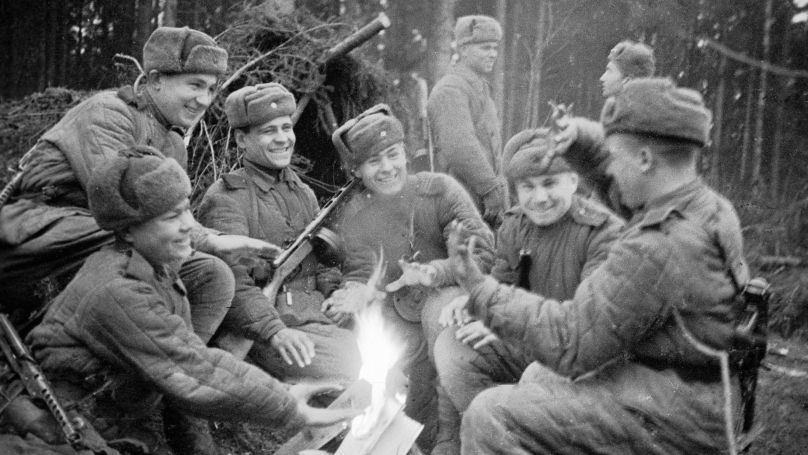
Vasily Ivanovich even now, after so many years, paid tribute to his then ingenuity: he ordered one squad to move to the place of the landing, take him alive and bring him to the company. And twenty minutes later the captured fighter pilot, who had decided to take a walk in the nearest Russian rear areas before dinner and see what was going on there, stood in front of Luzhkov, in his armour. One very clever man from the Leningrad militia, who could speak German, served in the company. However, he did not have a chance to show off his skill - the prisoner flatly refused to speak: he looked down on Vasily Ivanovich, showing that they were not equal and had nothing to talk about. Other soldiers wanted to take him down a notch, but the authorities were searching for the prisoner and demanded to transport him to higher headquarters.
That pilot, as Vasily Ivanovich remembered, in no way resembled the invalid he had seen yesterday. Another prisoner, whom Luzhkov later met on the same Leningrad front, when they broke through the blockade of the city, did not look like him either. That one was a big man, shell-shocked and covered with dirt: one of our heavy, probably a battleship gun projectile, had exploded next to his trench.
The third and fourth prisoners did not make things clear, and the other prisoners were difficult to remember. Then, when they defeated and captured the enemy's Courland grouping, there were thousands and thousands of prisoners of war, and Luzhkov's battalion escorted them to the rear but it was impossible to remember everyone – they all merged into one muddy mass – there was an infinite number of them; they were obedient, still accustomed to following orders.
“Courland, Courland...”, Vasily Ivanovich was thinking about something else already. Not everyone knows what Courland is and what kind of war was there. One young man, who sat at the same table with them in the dining room of the sanatorium, was very surprised when he heard that Vasily Ivanovich ended the war in Courland, south of Riga and he even thought that they were making fun of him. It turned out that the person did not know about the hostilities in Latvia, where more than three dozen German divisions were surrounded and where the war continued longer than in Germany itself. And before that, our exhausted and thinning regiments fiercely resisted and had a very hard time there.
Vasily Ivanovich remembered how unbearably long and difficult 8 May was for him and his comrades. In the morning, they were told – and the "soldier's telegraph" was rarely mistaken – about the final surrender of Nazi Germany. And during that gloomy, humid, and slow day these conversations became even more active.
“It's all over there, but here these bastards don't even think to surrender!”, Luzhkov heard several times.
Everyone looked somewhat detached, they all were waiting for something and reacted to each buzz of the phone.
Major Luzhkov’s rifle battalion was advancing in the second line of the regiment, or rather, not advancing, but standing, scattered in the woods. The advance of the battalions of the first line had stopped, and Vasily Ivanovich felt that at night they would change places: those that are in the first line now will move to the second line, perhaps they will pull back into this very forest, and his battalion will be ordered to attack.
The assumption was correct – the regimental commander called and demanded to come to his observation post.
Vasily Ivanovich still remembers how he reluctantly went to the regimental commander. His eyes reflected all his fears about the outcome of the coming night: his soul was filling with fear for his own survival, fear contrary to his nature. He hadn’t felt anything like that for the whole war. He could not understand why one has to throw himself into the fire when the fire had been already extinguished.
Tossing and turning in bed Vasily Ivanovich recalled how the regimental commander met him and how complex the range of feelings that he saw in his eyes and his whole appearance.
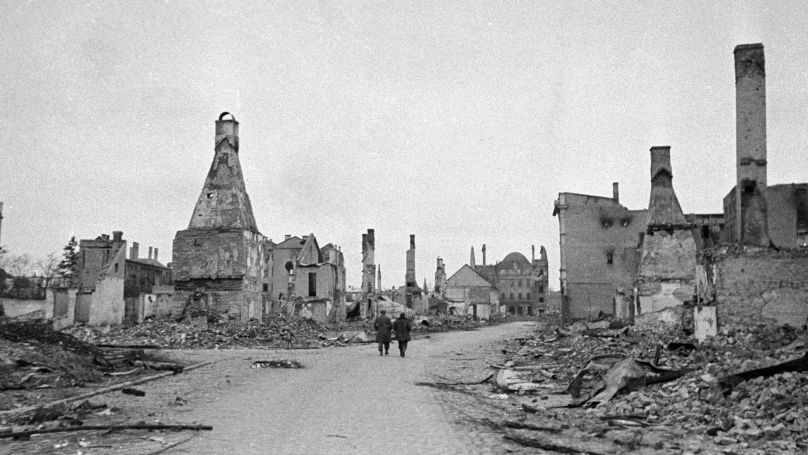
“And I do not understand!”, he blurted out, reading the mute question Luzhkov’s eyes, and expressively threw up his hands. Then, in a different, official tone, he added: “Or it may happen that you and your battalion will put a period on this war, my dear comrade”.
The regimental commander, before formulating the task for Luzhkov's battalion, said something meaningful, but Vasily Ivanovich could not begin to recall that, since his memory had suddenly moved to another place and became concentrated on another subject, on what happened after he left the regimental commander and returned to his battalion.
“Why didn’t I think of that earlier?”, Luzhkov reproached himself, and confident that he had finally found the cause, and got out of bed.
It would be appropriate to say here that the regimental commander, Lieutenant Colonel Nikulinsky, placed his observation post so close to the enemy that Luzhkov had to get to him in short runs, and sometimes even crouching. And on his way back he saw to his great surprise how a strange van was moving towards him along the broken front road, bouncing on bumps and potholes, in which he later recognised what was coming from their loudspeakers.
If it was a tank or an armoured car that would be something, but it was a defenceless plank body truck. “Either the war is really over, or those in this truck have gone mad”, the major thought to himself.
Meanwhile, the car stopped in a small bush, turned towards the enemy with two long faceted loudspeakers, just like those you could find in city streets at the time, and from this thing came a loud speech in German, overlapping the sounds of battle.
Luzhkov was very close. His military experience suggested that it wouldn’t end well, and he quickly headed towards some kind of pit or old ditch, taking the orderly along with him.
From this simple hiding place, they began to watch what was going on. The Germans, having heard the broadcast in their native language, became quiet. They not only did not fire at the car, but they stopped all fire in general: one must think, they wanted to know what the Russians would say on that day. But as soon as the speech ended enemy mines began to burst abruptly all around the truck. The driver tried to take the car out of the firing zone but it stopped within 10 metres. It stopped and immediately started burning, quickly turning into a blazing fire.
By some miracle, the people from the truck survived. Fleeing from the shelling, they ran in the direction of where the battalion commander was hiding with the orderly. And then Luzhkov noticed that one of them was dragging his right leg – it was wounded or injured.
Now, Vasily Ivanovich was trying to remember the face of that man and imagine him as best he could. A thought about the similarities between the man who was dragging his right leg and the man that he saw yesterday at the spring shook his entire being.
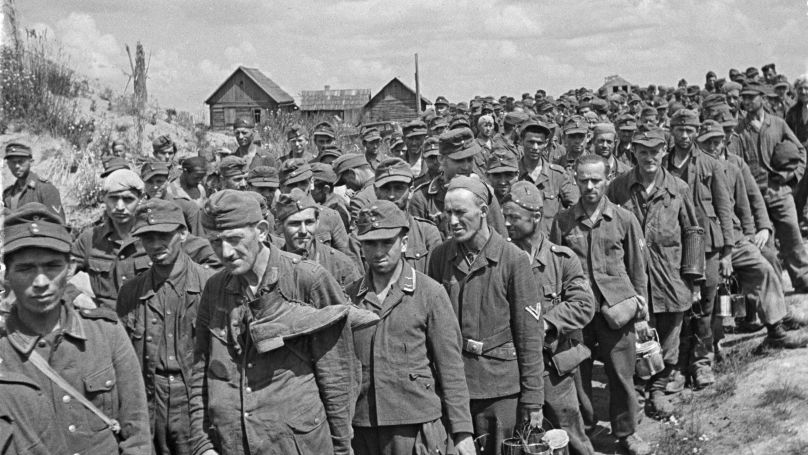
“Why didn’t I think of him immediately?”, Vasily Ivanovich wondered, “Why did I start remembering all the captured Germans, and left this one aside and only accidentally remembered him? Perhaps it was because at the front every German was your enemy, and you could see a German either in hand-to-hand combat, or defeated, or captured, and that German was completely different, he was not an enemy, but a comrade, a friend, and he moved beyond the usual memories, but stood apart from all memories as if he was behind the screen”.
Luzhkov even remembered his name because as soon as they were in the same crater, the older of the two men, the captain, immediately asked:
- Kurt, what happened? Show me your leg.
The one who was named Kurt waved his hand indifferently, pretending that nothing terrible had happened. But he was wrong. When they pulled off the boots from the wounded man, we saw that not only the skin of his leg but also the bone was hit by a mine fragment.
The wounded man, at the suggestion of Vasily Ivanovich, was taken to the first-aid post of his battalion. And on their way, while they were walking and crawling through open places, Luzhkov learned from the captain the short story of the German he had met by chance.
Kurt went to the front in the spring of 1944 – before that he was kept in the rear and looked after - the authorities, apparently, did not really appreciate the genealogy of the young man, who came from a family of a worker and a communist in the past. And as soon as the young walked into the field of battle, he did not fail to take advantage of the first opportunity to take his place in the struggle, which, as he believed, was intended for him by duty and conscience.
It happened near Narva. On an early April morning, after a lot of artillery and air preparation, the Nazis attacked. But their attack failed. Only in one or two places did the enemy break through the Soviet lines but they were later stopped and driven back. Kurt didn't miss his chance. Pretending to be dead, he did not follow the Nazis as they were leaving, but stayed on the ground. And when all was quiet, he got up and with raised hands went to meet the first Red Army man who caught his eye.
The young German man declared that he was ready to help the Red Army with all his might in the fight against fascism at the very first interrogation.
Kurt became close to the anti-fascist Germans, worked with prisoners of war, once even went behind the front line and returned with important information about the enemy’s plans. He did not return alone but brought with him two more Germans. On the last day of the war, he volunteered to urge German soldiers to stop the futile resistance, to report the end of the war, and the complete defeat of Nazi Germany.
As soon as Kurt was bandaged and prepared for dispatch to the medical battalion, Luzhkov was informed that the Germans had thrown up white flags along the front line. The time would come, and he would learn that the enemy did this on orders received from Germany under the terms of the unconditional surrender. But then it seemed to him that the speech delivered for the German soldiers witnessed by him also played a role. And this aroused and strengthened his feeling of sympathy for the German youth, who had dared to undertake such a risky venture, and now, he was wounded in his battalion.
Events at the end of that day in May were moving swiftly and not always predictable. Luzhkov left his new comrades for a few minutes and ran into the staff entrenchment to give some orders, but when he came out he saw something that both delighted and stunned him. The first column of prisoners of war was stretching along the road to the forest, and then his battalion felt as if blown away by the wind: people, raised by some unseen force, came out from their places, left weapons and equipment in the forest, and ran to the main road.
It was impossible to stop this wave, so the choice was either to join it or to watch the unstoppable rush of his men. But Luzhkov did neither: he ordered the chief of staff to immediately summon the company commanders, assemble and line up the battalion, and went back to the infirmary.
There, the excitement was great too, and everyone was looking at the road. The captain and the truck driver were supporting Kurt by the arms, and Kurt, oblivious to his injury, was exclaiming loudly and cheerfully.
“Now we will know how the war ends”, the captain said to Luzhkov, and as he saw the cart parked beside them he began to thank the commander for his help and concern.
Kurt was still staring at his compatriots walking gloomily, who had been shooting at him an hour before. Luzhkov did not interrupt him from contemplating the picture – a picture one gets to see perhaps once in their life. He himself stared avidly at the long line of disarmed, subdued enemies.
Then he walked over to the cart and adjusted the straw on it as if inviting his guests to go on their journey. He was, in truth, reluctant to let them go, but he feared every moment of delay: the wound on Kurt's leg frightened him perhaps more than the wounded man himself, and the young man's pale, haggard face spoke for itself.
Luzhkov said his goodbyes to the captain and the driver of the burned vehicle; then held out his hand to Kurt, looked into his eyes and saw so much warmth and affection in them that he did not hold back and embraced him. Kurt hastily responded in kind. They stood like that for a few moments, Russian and German, hugging each other.
“Good luck!”, the major shouted as the cart drove away. And remembering the pre-war, almost forgotten phrase, he added loudly: “Rot Front!”
While he was tending to the wounded man, the battalion had gathered and lined up, and Luzhkov did not go but rushed to his men.
The sense of the exceptionality of the moment filled him more and more. He had already forgotten the childish prank of his battalion, running to see the surrendering Germans, because, in truth, he himself was drawn to the road, he also wanted to enjoy the long-awaited picture of the fall and disgrace of the enemy.
...The dawn was breaking in the windows of the sanatorium ward when Vasily Ivanovich felt tired and fell back to sleep. But before he fell asleep, he was determined that with the advent of the day he would seek another meeting with the man whose image had emerged from the distant last day of the war.
Mikhail Loshchits
